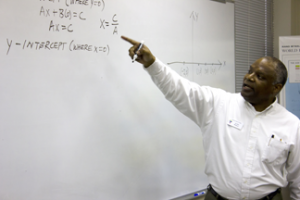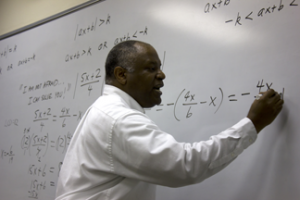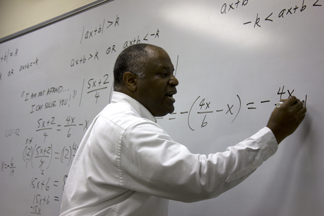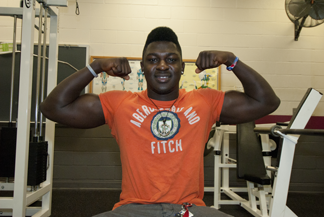By Sherlett Warren/nw news editor
NW professor Archie Wilmer is the first and only African-American West Point graduate to earn a doctorate in applied mathematics.

Eric Rebosio/The Collegian
“I’m the only one to fit those three things simultaneously,” he said. “I’d like that to change.”
Wilmer, a retired U.S. Army lieutenant colonel, wants to identify and mentor those who have an interest in science, technology, engineering and math, also called STEM.
“I’m interested in the social aspect of mathematics,” he said. “Our nation needs more STEM professionals.”
Wilmer remembers having a natural curiosity in solving math problems as a child and said he loved puzzles and mentally challenging games like chess.
“I even liked tic-tac-toe,” he said.
Growing up in Mineral Wells, he said the small town environment was a rich experience for him.
“Everybody knew everybody, and I had teachers who recognized my interest in math,” he said.
In the past, many K-12 teachers were not confident teaching math because they did not have a math background, Wilmer said.
“I see so many students who are afraid of math, and it’s understandable because a bad math instructor, especially in the early grades, can set a student back three years,” he said. “This puts pressure on college math programs to repair the damage by re-teaching students.”
When Wilmer was in high school, he always sought to learn as much as he could about math. After gliding through Algebra I and II, he started an independent study in trigonometry and calculus.

Eric Rebosio/The Collegian
“I graduated with honors and performed well on my SAT,” he said.
His love for mathematics opened many doors for him. The U.S. Military Academy at West Point reached out to him based on his SAT scores and teacher recommendations indicating leadership.
“West Point also wanted to increase minority presence on campus,” he said. “So there I was, a boy from a small town in Texas, in the South, standing shoulder-to-shoulder with valedictorians from all over the nation.”
Wilmer entered West Point in the early ’70s during a period of many social landscape changes including civil rights, the Watergate scandal and Vietnam. Minorities were attending the academy in larger numbers, and his class was one year behind the first class to admit women in the history of the school.
“It was a challenge. It was a culture shock, and the winters were frigid,” he said.
Part of the culture change for Wilmer stemmed from his not coming from a military family.
“I only had one male teacher from kindergarten through the 12th grade, but at West Point, all of my teachers were males,” he said.
The added military influence in the classroom helped him learn to accept changes in his understanding.
“What was said was life or death and could affect your ability to be successful on the battlefield,” Wilmer said. “It was like taking a cold shower every day.”
Wilmer earned his degree in mathematics at West Point in 1982. Subsequently, he attended the Ordinance Officer Basic Training Course at Redstone Arsenal, Ala., the testing and development center for the Army’s missile program and host to numerous military operations and agencies.
As he continued his education, Wilmer traveled around the world and excelled as an officer.
He also started pursuing a master’s degree and eventually earned a doctorate in applied mathematics from the Naval Postgraduate School in Monterey, Calif.
“I love differential equations. I just love them,” he said. “They model so much phenomena that we see in our everyday world — mechanical vibrations, the buckling of beams and plates, construction, naval vessels, aircraft design, car design.”
Wilmer returned to West Point and served as a senior military professor in the mathematical sciences department. He taught, trained and coached cadets how to reason, think independently and solve problems, skills needed for the Army of the 21stcentury, he said.
“The leadership at West Point Academy and in the Army understands the importance of diversity,” Wilmer said. “I have learned and benefited from diversity.”
After serving his country for 28 years, Wilmer retired from the Army in 2007. He moved back to Texas with his family and started teaching at TCC.
“We have a talented and dedicated group of math instructors at Tarrant County College NW,” said Vicky Gatewood, NW math department co-chair. “Archie fits right in with this incredible group. He is dedicated to helping our students succeed. He has been working on several committees. He is always willing to go the second mile. His education and experience truly strengthens our department. Archie is a great asset to Tarrant County College, and we appreciate his great efforts.”
Wilmer said he wants to help students stay positive about math.
“I wanted to keep teaching at the college level,” he said. “But I had to change my teaching methods in order to help students develop.”
He did not want to impose a style of teaching that was too rigid.
“I have more of a mentoring role now,” he said.
He volunteers as a tutor for Helping Other People Excel (HOPE Farm) a faith/Christian-based, nonprofit organization that reaches out to at-risk boys in Fort Worth who don’t have a positive male influence in their lives.
He also serves as deputy director for the Center for Leadership and Diversity for STEM.
“I want to explore the underrepresentation of women and minorities in STEM programs,” he said.
His daughter, Sterling Alexandria Wilmer, is not sure if she wants to pursue a STEM career.
“I’m a teenager, and so I have time,” she said. “I appreciate my dad, though. Whenever I have homework, he’s like my own personal math tutor.”
She said she has to work at math but feels confident because of her father’s influence.
“He says he’s passionate about math, but I say that he has a superpower. Many people only know him as a great teacher, and he is, but I know him as a great dad,” she said.
Being from a small town, Wilmer said that he could not have planned or conceived the opportunities he’s had in life.
“I recognize a bigger hand orchestrating my life,” he said.
Part of his personal vision statement is to live in awe and fear of God and to enjoy all blessings from him, he said.
Wilmer’s favorite passage is from Frederick Douglass: “What was possible for me is possible for you.”





























